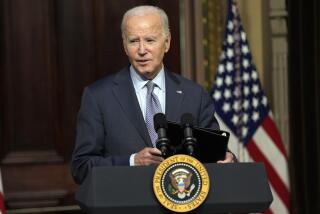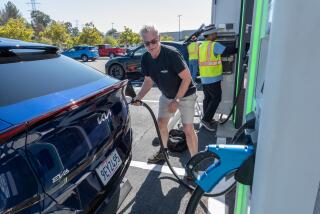Scientists Urge Congress to Fund Research on Plug-In Hybrid Cars
- Share via
WASHINGTON — A group of scientists urged Congress on Wednesday to fund research for plug-in hybrid vehicles, endorsing the technology as another way to reduce the nation’s dependence on oil through the help of a simple electrical socket.
With high prices straining some Americans’ budgets, advocates of the alternative vehicles told a House committee that plug-in hybrids could reduce gasoline consumption and air emissions. Whereas ethanol-fueled vehicles will require a better network of fueling pumps, they said, plug-in hybrid cars could recharge at home.
“To think that you could pull into your garage at the end of the day and ‘fill ‘er up’ just by plugging your car into a regular 110-volt socket in the garage is very appealing,” said Rep. Judy Biggert (R-Ill.), chairwoman of the House science subcommittee on energy.
Plug-in hybrids combine hybrid technology -- employing a gasoline engine and an electric motor -- with large batteries that can be plugged into standard wall sockets. Rep. Lamar Smith (R-Texas) said he would introduce legislation to provide $250 million in grants to research battery technology and develop a fleet of demonstration plug-in vehicles.
President Bush has called for more research to develop smaller, longer-lasting batteries for plug-in hybrids, noting that the technology could help motorists drive 40 miles on the battery without having to use any gasoline.
Andrew Frank, a mechanical and aeronautical engineering professor at UC Davis, said researchers had developed preproduction vehicles but needed funding to create a fleet of about 100 plug-ins that could be tested around the country.
The auto industry has said that the technology offers promise but notes that it is too early in the development of advanced batteries and hydrogen vehicles to know whether plug-in hybrids could become cost effective. Hybrids account for about 1% of the U.S. auto market.
The additional battery capacity can add 500 pounds to the vehicle, reducing its performance, and the demands on the battery are greater, leading to faster deterioration of the battery.
John German of the U.S. arm of Honda Motor Co. of Japan told lawmakers that the technology offered potential but that the larger battery pack “adds thousands of dollars to the initial price of the vehicle and detracts from the performance and interior space.”
Others have worried that thousands of plug-in hybrids could overwhelm the electric grid.
But Roger Duncan, deputy general manager of Austin Energy in Texas, said the obstacles involving the batteries could be addressed.






